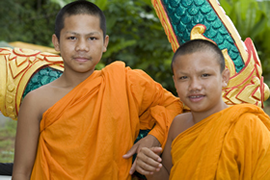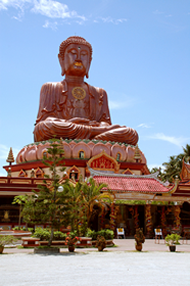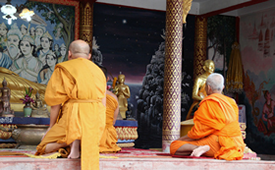Buddhism – The Main Thailand Religion
The main Thailand religion is Buddhism. Approximately 95% of the country’s people are Buddhists. Besides this, there are Muslims, who account for about 5% and the remaining are Sikhs, Hindus and Christians, all of whom contribute to the multicultural dimension of the country.
The Government allows the practice of all these religions without restrictions.

As the principal Thai religion, Buddhism has a large influence on the country’s culture and the way of life of its people. The Buddhism that is practised in Thailand is called Theravada, which is believed to have spread from India to other parts of Southeast Asia, including Thailand. It is the oldest form of Buddhism, originating from the teachings of Buddha after he attained enlightenment or nirvana. This Thailand religion is based on various principles known as Dhamma.
The history of Buddhism as a religion in Thailand dates back to the 13th century A.D., when it was made the state religion in the Kingdom of Sukkothai. Although there are almost no surviving records of the Thailand religion in the subsequent period up to the 19th century, largely due to the destruction of the Kingdom of Ayutthaya during Burmese invasion, it was during this time that people started looking at the correlation between the community and the King, who was considered the protector of the religion. To this day, the King of Thailand is revered and respected for this reason.

At the centre of the Buddhism religion that is practised in Thailand are the four noble truths. These are based on the beliefs that life has suffering, suffering brings with it attachment, suffering can be stopped through extinguishing attachment or cravings, and finally the need to follow the eight fold path to put an end to suffering. As the Thailand religion, Buddhism seeks to enable followers to find the mid path between extreme indulgence and extreme abstinence, based on the belief that leading a life that is moral will put an end to the cycle of rebirth.
In addition to the four noble truths, Buddhist religion also lays down the cause and effect reaction or karma and a moral code that needs to be followed. These include principles such as every action having an effect, as well as guidelines about how to lead a good life by not taking a life on another living thing, not taking anything that is not freely offered, refraining from overindulgence of the senses, refraining from intoxication and not saying anything that is untrue. These simple tenets and principles have a far reaching effect on Thailand religion.
Buddhism as it exists in Thailand today has the influences of several different principles and beliefs. The influence of the Theravada school of Buddhism is, of course, the most visible. However, influences of Hinduism that came in from Cambodia in earlier times as well as folk customs and rituals can also be seen in the way Thailand people practise Buddhism. Merit making is a common practice that you will come across at temples during festivals and otherwise, stemming from the belief that helping others, making offerings to monks and other such good deeds will earn a lay person credits that will bear fruit later in life or in a subsequent life after rebirth.
The teachings and practices of Buddhism have a marked influence on Thailand culture.
From the peaceful nature of the people to the constant smiles and humility, a visitor to the country can better understand the reason why people are the way they are, once they understand the main Thailand religion and its influences on the daily lives, politics and other aspects of the local Thai people. It will also give a more complete understanding of the customs and rituals during festivals and other ceremonies that they witness.
